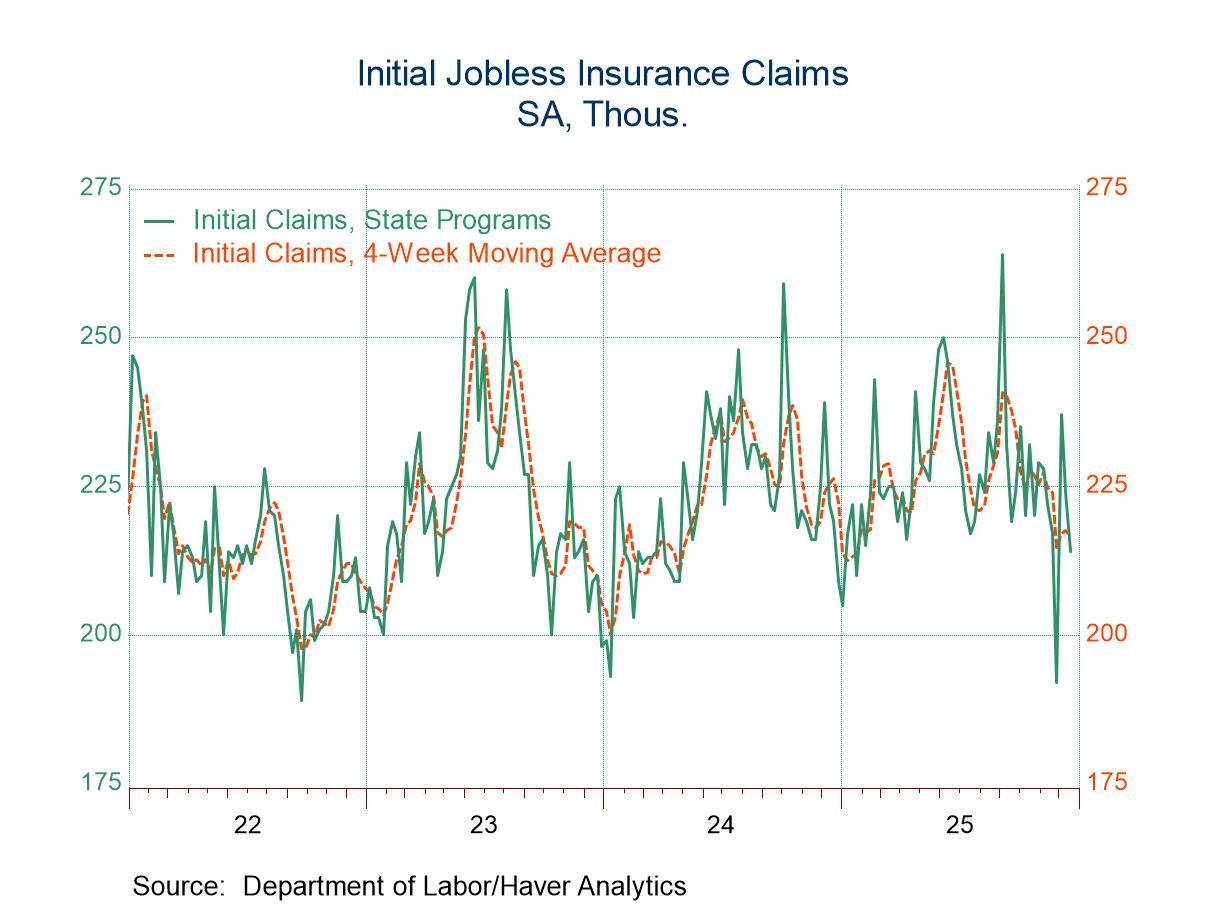U.S. JOLTS: Job Openings Fall Sharply in April
by:Tom Moeller
|in:Economy in Brief
Summary
- Openings remain well below 2022 high.
- Hires improve slightly m/m, but are sharply lower y/y.
- Quits rebound.


Job openings declined 296,000 (-18.6% y/y) during April to 8.059 million after falling 458,000 in March, revised from -325,000 according to the Job Openings and Labor Turnover Survey. The number of job openings have been trending lower since early-2022. The latest reading is well below the recent peak of 12.182 million reached in March 2022. The job openings rate eased to 4.8% from 5.0% in March, revised from 5.1%. It stands well below a high of 7.4% in March 2022 and is now the lowest since January 2021. This rate is calculated as the ratio of job openings to total nonfarm employment plus openings.
Private sector openings declined 223,000 (-19.1% y/y) to 7.174 million in April following a 497,000 March decline. The private sector job openings rate fell to 5.0% from 5.2% in March. It stood at 6.3% just twelve months earlier. The level of leisure & hospitality openings declined 9.1% (-21.3% y/y) and information openings declined 28.3% (-27.8% y/y). Private educational & health service openings weakened 8.1% (-10.2% y/y) and financial sector openings eased 0.4% (-1.6% y/y. Working the other way, trade, transportation & utilities openings rose 1.4% (-37.2% y/y) while openings in professional & business services increased 8.8% (-4.4% y/y). Manufacturing job openings declined 5.5% (-20.2% y/y) and construction openings were off 2.3% (-6.9% y/y). Mining & logging openings declined 10.0% (-22.9% y/y). Government sector openings decreased 7.5% (-14.9% y/y).
Private sector hiring increased 0.8% in April (-5.3% y/y) to 5.272 million after falling 2.8% in March. The private sector hiring rate held steady with March at 3.9% versus 4.2% twelve months earlier. Hiring was strongest in the service sector where the number of jobs in trade, transportation & utilities rose 8.9% (-7.9% y/y) and educational & health services jobs rose 3.0% (9.3% y/y). Financial sector hiring improved 2.1% (-7.9% y/y) and trade, transportation jobs rose 8.9% (-7.9% y/y). Working lower, leisure & hospitality hiring declined 7.1% in April (-9.1% y/y) and professional & business services fell 5.8% (-11.8% y/y). Information hiring declined 12.8% (-7.4% y/y). Construction sector hiring weakened 5.6% (3.0% y/y) but factory sector hiring rose 21.3% (-0.5% y/y). Government hiring weakened 4.2% (-3.9% y/y) in April, reflecting an 18.2% decline (-20.0% y/y) in federal government hiring.
Total separations rose 0.8% (-3.5% y/y) to 5.372 million in April after a 3.8% March decline. The separation rate held steady at 3.4%. Private separations increased 0.2% (-3.9% y/y) in April after a 3.9% March decline. Government sector separations increased 9.4% (2.8% y/y) after falling 1.8% in March.
Private sector quits increased 1.9% (-3.7% y/y) following a 3.0% March decline. Government quits jumped 21.3% (11.3% y/y). The overall quits rate was steady at a reduced 2.2% for the sixth consecutive month. Private sector layoffs declined 5.2% (-6.8% y/y) in April led by a 21.6% falloff (+1.9% y/y) in the leisure & hospitality sector. Government layoffs fell 8.8%, off 16.2% y/y. The layoff rate overall held at 0.4%.
The Job Openings and Labor Turnover Survey (JOLTS) data are available in Haver’s USECON database.
Tom Moeller
AuthorMore in Author Profile »Prior to joining Haver Analytics in 2000, Mr. Moeller worked as the Economist at Chancellor Capital Management from 1985 to 1999. There, he developed comprehensive economic forecasts and interpreted economic data for equity and fixed income portfolio managers. Also at Chancellor, Mr. Moeller worked as an equity analyst and was responsible for researching and rating companies in the economically sensitive automobile and housing industries for investment in Chancellor’s equity portfolio. Prior to joining Chancellor, Mr. Moeller was an Economist at Citibank from 1979 to 1984. He also analyzed pricing behavior in the metals industry for the Council on Wage and Price Stability in Washington, D.C. In 1999, Mr. Moeller received the award for most accurate forecast from the Forecasters' Club of New York. From 1990 to 1992 he was President of the New York Association for Business Economists. Mr. Moeller earned an M.B.A. in Finance from Fordham University, where he graduated in 1987. He holds a Bachelor of Arts in Economics from George Washington University.






